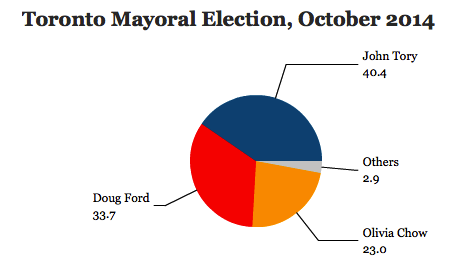As usual, the supporters of Rob and Doug Ford proved a potent force in Toronto’s municipal politics, bringing the mayor’s elder brother much closer than polls predicted to winning the city’s mayoral election tonight.![]()
![]()
![]()
John Tory, however, the former leader of the Progressive Conservative Party of Ontario, managed to unite center-right and moderate voters, narrowly edging out Ford (pictured above) and third-placed candidate Olivia Chow.
Chow, a former city councillor and the widow of Jack Layton, the former leader of the progressive New Democratic Party (NDP), began the race earlier this year as its frontrunner. Since July, however, Chow sunk to third place, falling behind Rob Ford who, until his cancer diagnosis in September, was still running for reelection. Incredibly, both Fords commanded a strong core of supporters among the self-proclaimed ‘Ford Nation,’ despite a turbulent four years in which the mayor admitted to crack cocaine use and alcohol abuse, was stripped of many of his executive powers by the Toronto city council, and attended a recovery program for substance addiction.
* * * * *
RELATED: Rob Ford’s crack cocaine scandal, urban politics and the new face of 21st century Canada
* * * * *
Such was the power of Ford’s everyman charm that he retained the loyalty of the suburban and working-class voters that fueled Ford Nation. His supporters include a surprisingly high number of racial and ethnic minorities, despite Ford’s sometimes culturally uncomfortable moments (swearing, perhaps drunkenly, in Jamaican patois, for instance). The lingering regard with which ‘Ford Nation’ held for Rob meant that Doug Ford was always a potent candidate for mayor.
Notably, Rob, whose chemotherapy treatments limited his campaigning, still won a seat on the city council from Ward 2 in his native Etobicoke with around 59% of the vote — it’s the seat that he held in 2010 when he was elected mayor. Opponents breathing a sign of relief at Doug Ford’s loss tonight might not want to relax too much. A wiser and healthier Rob Ford could easily return in 2018 as a formidable candidate.
In Tory (pictured above), Toronto will have a prudent, center-right mayor who will refocus attention off the Ford family’s personal lives and back to the more mundane concerns, chiefly about public transit and Toronto’s island air traffic, but also about, taxes, schools and governance. Tory, who narrowly lost the 2003 mayoral race, led the Ontario Tories between 2004 and 2009, though he lost his own seat in the 2007 provincial election.
Tory, who isn’t exactly known for his charisma, should take some of the lessons of the Fords’ successes to heart. Through all of his failures as a public official, Rob Ford never lost the unique link that he had with many of supporters. Part of that is due to his painfully real human vulnerability, but also due to his willingness to respond personally to city residents on just about any matter (except, alas, when it came to press inquiries about his mayoral and potentially criminal personal misdeeds).
If Tory’s brand of leadership will restore quiet, competent governance, Chow’s implosion shows just how much the 1998 amalgamation of metropolitan Toronto with five surrounding (and less left-leaning) municipalities, including Ford’s Etobicoke, has changed the politics of Toronto.
When she stepped down after eight years representing downtown Toronto as its MP in the House of Commons to run for mayor, Chow seemed the odds-on favorite. But she won even fewer votes than George Smitherman, the hapless candidate who lost the 2010 race to Ford.
With conservative voters split between Ford and Tory, Chow should have easily consolidated Toronto’s centrist and center-left voters. Instead, she offered a lukewarm and unenthusiastic campaign that critics alleged leaned too much on the memory of her late husband, who died shortly after leading the NDP to historic gains in the 2011 federal elections and becoming the leader of Canada’s official opposition. A nasty Toronto Sun cartoon from last week summarized, in crude (and racist) terms just what many Torontonians had come to believe about Chow.
Though the mayor’s office is relatively weak and, ultimately, carries just one vote among the 45-member city council, the Toronto mayoral contest amounts to the largest direct election in Canada, where voters elect provincial and national leaders indirectly through parliamentary systems. That means that, until tonight, at least, Rob Ford had won more voters, in a personal capacity, than any other politician in a Canadian election (excepting party leadership elections, of course).



New net programme:
http://rosemarie.web.telrock.net
I am actually glad to glance at this web site posts which carries tons of useful data,
thanks for providing these data.